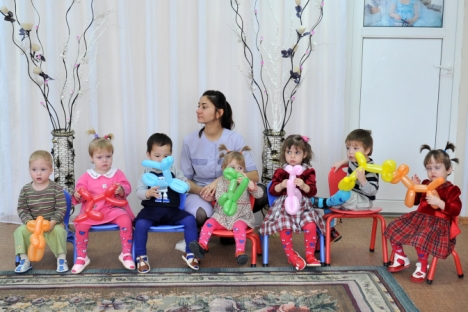Orphans vs jobs

Orphans vs jobs. Source: Vladimir Pesnya / RIA Novosti
In all of the talk about adoptions in Russia lately, one major point must not be forgotten – Russian orphanages are an example of a self-perpetuating system. Very often, that system is there to serve its own interests.
Take the case of “Petrovich,” for example. Petrovich was a four-year-old orphan who was deliberately labelled an “imbecile” by the medical commission in his orphanage – and shipped off to a home for severely mentally handicapped children. Any child who ends up in such a home has no future. “Where have you brought me to?” Petrovich sobbed to his speech therapist, after arriving in that dark place and being immediately beaten up.
When writing about Petrovich, journalist Yulia Melamed noted that doctors that evaluate the little Petroviches are more interested in having the last word than in making sure that a small child has the chance to be adopted, or at least to lead a semi-normal life in a proper orphanage. Yet there is also the issue of money. The more children are shipped off to a facility – the more funding said facility will get.
Even laying aside the issue of how the system is used as a kind of “feeding trough” for various financial interests – noted by the likes of psychologist Lyudmila Petranovskaya in her comments to Bolshoi Gorod earlier this year, before the recent adoption scandal erupted – we are still stuck with the fact that in this system, the interests of the children are often the least important. Not because everyone who works in the system is evil and barbaric, but simply because the kids depend on the officials. And many of those officials would rather keep their jobs than see most of their charges be adopted out. It only makes sense. They too have families to take care of.
So what is there to do? Well, since the issue of orphans has been raised – how about we don’t forget them when the news cycle shifts once more? With or without American adoptive parents, the Russian orphanage system needs reform – and the word “reform” doesn’t just mean “better funding.” It means better care, it means more adoptions, it means more transparency, and it also means job placement for those who have served the children faithfully.
First published in the Moscow News.
All rights reserved by Rossiyskaya Gazeta.
Subscribe
to our newsletter!
Get the week's best stories straight to your inbox